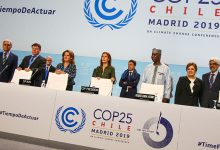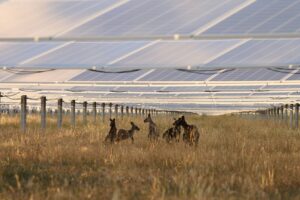Australia’s disgraceful performance on climate action is no longer a national secret: it’s now as visible as the bushfires that have been devastating regional Australia and the nation’s major population centres.
This week, the German-based think tank Germanwatch ranked Australia dead last in the world for both national and international climate policy commitments. It received a big fat zero out of 100.
Germanwatch cited Australia’s failure to set renewable energy targets beyond 2020, the government’s commitment to the expansion of Australia’s fossil fuel exports, and for Australia’s increasingly “regressive” stance when it comes to international cooperation on climate change.
Germanwatch also singled out Australia’s opposition to the inclusion of a statement on climate change from leaders at the Pacific Islands Forum held earlier in the year, Australia’s refusal to engage with the UN Climate Action Summit held in New York and for its refusal to provide further funding to the Green Climate Fund.
It’s an embarrassing outcome for Australia and exposes the Morrison government for its lack of meaningful climate and energy policy on a world stage.
From being in a position where Australia had one of the world’s leading climate policies just six years ago, before the Coalition tore down the carbon price and as many institutions as it could, Australia now even trails behind the US, which is being pulled out of the Paris climate treaty by President Donald Trump.
The assessment by ClimateWatch mirrors the total failure on emissions that emerges from updated projections of Australia’s greenhouse gas emissions released on the weekend.
It shows that the Coalition has achieved nothing on emissions reductions, and the Morrison Government is effectively reliant on a “cooking of the books” of excess carbon credits to meet its modest 2030 target.
It has effectively chosen a different “methodology” to calculate past and present emissions. This has the effect of increasing the notional “surplus” from the Kyoto targets, where Australia was controversially allowed to increase emissions, and then allows it to “claim” to have met its Paris 2030 targets by doing very little.
Any actual emissions reductions delivered by 2030 are minimal, and are achieved only due to the ambitious renewable energy targets put in place by State and Territory governments that is demanded be repealed, and through technologies that it has said are a threat to the nation’s economy,
Since 2014, greenhouse gas emissions data showed Australia’s emissions steadily increasing since the repeal of the carbon price. However, the latest update suddenly shows Australia’s historical emissions trending downward.

The reversal of this trend has little to do with any substantive action to reduce Australia’s emissions on the part of the federal government, but largely reflects a decision by the Federal government to apply a different methodology to calculate emissions from the land sector.
The application of a new methodology saw historical emissions re-calculated and pushed up, without significantly changing present and future emissions and has the effect of inverting Australia’s emissions trend from increasing to decreasing.
Looking into the future, the updated projections show that the only sector of the Australian economy expected to deliver any substantial reductions in greenhouse gas emissions is the electricity sector, given by increased investment in wind and solar projects, underpinned by the State targets.
Emissions in most other sectors are expected to increase from their 2019 levels, including manufacturing and industrial emissions, transport emissions, fugitive emissions from natural gas and coal production and a recovery in agricultural emissions.
This reflects the lack of an economy-wide policy from the federal government to reduce Australia’s greenhouse emissions.
The Morrison government now banking on the fact that state-based targets will take Australia to around 50 per cent renewables by 2030, an outcome the Coalition claimed would be ‘economy wrecking’ when a 50 per cent renewables target was proposed by the Labor party under Bill Shorten.
However, a gap still remains in Australia’s emissions budget out to 2030, to achieve a 26 to 28 per cent emissions reduction. A gap that the federal government intends to fill with surplus Kyoto-era permits.
These Kyoto-era permits are under heavy scrutiny and have often been described as ‘hot-air‘ as there is little by way of actual action to substantiate their environmental integrity.
Having set a series of overly soft emissions reduction targets, Australia has a vast surplus of emissions allowances under the Kyoto Protocol. Australia’s Kyoto surplus is merely a reflection of Australia’s unambitious targets, rather than any structural change towards decarbonising Australia’s economy.
The combination of these factors means that the Morrison government essentially considers that additional action its own part is required to meet the 2030 targets. It will leave the States to do the heavy lifting in the electricity sector, and use the creative accounting trick to bridge the gap.
The use of the Kyoto carryover surplus represents almost all of the federal government’s contribution to meet the 2030 Paris target, a plan that is now at risk of collapsing as around 100 countries seek to prohibit the use of surplus Kyoto units under the Paris Agreement during the UN climate talks in Spain.
The use of the Kyoto permits was criticised by former prime minister Malcolm Turnbull at the National Smart Energy Summit on Tuesday, who said that a heavy reliance on the Kyoto carryover units would simply make Australia’s task harder in the long run.
“My concern about using them for nearly half the lifting is that it leaves you in 2030 with an even bigger mountain to climb, going into 2035 or 2040,” Turnbull said.
“You’re really setting yourself up for a superhuman effort post-2030 if you were to use all the credits.”
The Germanwatch assessment shows that there is growing attention, both in Australia and internationally, on Australia’s failure to establish a meaningful response to the climate crisis, and that Australia’s emissions trajectory was not consistent with the Paris Agreement goals to achieve zero net emissions by mid-century.
This was a point made by Australian Conservation Foundation campaigns director Dr Paul Sinclair who said the Germanwatch assessment of Australia’s climate policies showed Morrison and Taylor’s claims Australia was acting was spin.
“It’s clear the Morrison Government’s climate policies have no teeth,” Sinclair said.
“The Morrison Government owes it to all Australians facing worsening drought, greater extreme heat and more dangerous bushfire seasons to quickly bolster domestic climate action in line with the objectives of the Paris Agreement and become a more forceful global advocate for change.”
The Australia Institute’s climate and energy director Richie Merzian, who is in Madrid observing the talks, said that Australia’s poor climate policy stance meant that it was running out of credibility on the international stage.
“Australia will find it harder and harder to argue for special treatment in the UN climate negotiations, including to secure a loophole to reduce its emission reduction efforts under the Paris Agreement,” Merzian said.
“Sometimes, it takes an outsiders perspective to realise how wrong things are on the inside in Australia when it comes to climate change. Hopefully, this result acts as a wake-up call to increase local action and global cooperation to solve the climate crisis.”
The UN climate talks in Madrid are scheduled to run until the end of the week but regularly run overtime. There is a high likelihood that the talks won’t finish until some point during the weekend, at which point the fate of the Kyoto carryover units should be known.









